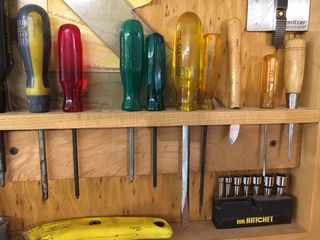
Depression
Remainders: Sorting Through Possessions After a Death
Carefully dispersing loved ones' objects aids the grieving process.
Posted April 11, 2018
"Joyce, what do you want me to do with these dresses?”
My brother stands in the main room of our family cabin, a log home in Western Colorado, built by our parents when they retired. Our mother had died several days ago. Since our Dad will not be staying for the winter in the cabin, at 10,500 feet in elevation, we need to pack to return to Mom and Dad’s duplex in Colorado Springs. I’m in a bind, though. Our Dad can’t bear the painful reminder of Mom’s clothing in their shared space. He wants us to remove her personal objects.

“I don’t know,” I reply, “just leave them on the sofa while I decide.” He holds, among other garments, many of Mom’s handmade dresses and suits.
“And do you want to keep this?” My brother holds up the teal dress she wore to my wedding.
My mother’s clothes don’t fit me; I want my mother, not her dress. Not coming up with better options, we decide to pack her clothes to give to a women’s shelter. As my brother carefully loads them into black plastic bags, I have to look away. My mother’s personally chosen fabrics and delicate stitches disappear.
I have now participated in the clearing out of objects after a loved one’s death eight times. Most of us will face this challenge. I learned lessons about death’s remainders.
Urgency Clouds Discernment
After a death, the memorial service must be planned, people travel to gather together, the house or apartment may be full of family, and people feel urgency about getting back to their lives, often elsewhere. But the stuff remains.
Family members would say, “This exquisite china and crystal. Surely someone in the family wants it. What about Katie?”

Often the younger person in question lives a different lifestyle, and the family furniture, tableware, art and rugs don’t find a home.

Some jewelry may be dispersed to friends and family, while much remains. A few items of clothing may be carefully saved, but most must be given away. A few books, records, CD’s and scrapbooks find homes, but often people don’t have room or the desire to acquire more possessions. I look back and wish I had saved a few more items from my sister, mother, father, mother-in-law, and father-in-law. But we were hurrying. We did the best we could under stress.
Consult, Communicate and Respect Different Wishes
My brother and I decided, the next summer after our father had died, as well, that if anyone wanted to postpone a decision, or to keep an object, we would respect that. No exceptions. If no place remained for the object, the one who wanted to wait, or keep it, must find a place for it. We decided not to box china, flatware, linens, or fishing gear, art, and clothing to put in storage, hoping the younger members of the family might someday want them. We follow a “no-guilt-tripping” policy. If the niece says no, that means no.
Integrate Into Your Daily Life
I’m not a fan of “box it up and store it.” If possible, integrate the remainders of a loved one’s life into your own or others’ everyday life. Grandmother’s rose depression glass sits in my china cabinet. My sister’s jewelry takes its place among my own. I can easily turn to one of my Dad’s sermon manuscripts since I placed them in several binders on my bookshelves. When I sew on a button, I use Mom’s sewing kit. My husband stores his Dad’s screwdrivers in his woodworking shop; every time he reaches for one he remembers objects his Dad crafted for him.

I often come across Granddad’s one published novel, on Texas history, on our history bookshelf. My sister’s tee shirt, silver sparkles on robin’s egg blue background, remind me of the days just before she died. While too small for me, I touch it with a smile as I sort through my own shirts.
Remainders are Reminders
I learned that I could take pictures of treasures that I needed to release. This practice has helped me let go of objects. I know that as a baby boomer, soon I will decide what to do with treasures I have acquired in my lifetime. This is no time to add to my life footprint. I look at my own objects with a knowing eye, these days.
As we go to dinner one evening, my husband comments, “That lapis pendant looks great with your new shirt.”

“It’s Janice’s,” I reply, “as are these earrings.” Janice was my younger sister. Wearing her jewelry helps me feel close to her. I could not wear her clothes either, since she was a petite size 2.
My husband gently says, “Remainders are reminders that we loved them.” We must let go of most of their objects, as we learned to let go of those we loved.

